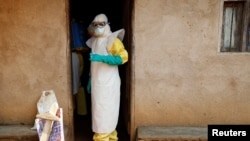The World Health Organization says insecurity and community mistrust in the Democratic Republic of Congo’s conflict-ridden North Kivu Province are major impediments to international health efforts to bring the deadly Ebola outbreak under control. Latest official figures put the number of Ebola cases in the Eastern DRC at 1,089, including 679 deaths.
The World Health Organization reports an increase in the number of Ebola cases. Last week, it says there were 72 recorded cases compared to 56 cases of the deadly disease the week before.
WHO Assistant Director-General for Emergencies Response Ibrahima-Soce Fall attributes the rise to insecurity and violence in the North Kivu hot spots of Butembo and Katwa. He says that has caused major disruptions in the ability of health workers to respond to the disease.
As a consequence, he says people in contact with infected individuals are unprotected. He says contacts cannot get vaccinated or be followed for signs of illness. He says burials are not conducted safely, resulting in some mourners becoming infected.
Speaking on a phone line from Butembo, Fall says the difficulty of getting people to understand that Ebola is a problem further complicates the situation.
“There are so many other problems like insecurity, being killed for many years, access to water, education and so on. So, it takes time to convince them that Ebola is the real problem for them," he said. "And that is why we have started this community dialogue — to listen to them, to understand their problems and working with diplomatic partners, like World Bank and UNICEF to address the other problems they have been having for many, many years.”
As part of this outreach program, Fall says 40 young people from the local communities have been trained and are now part of the burial and disinfection team. He says the response to this and other measures requested by the community are beginning to have a positive impact.
The WHO estimates it will take at least six months before it gains control of the Ebola outbreak. It says it expects cases will continue to increase until full response measures can be put in place in all vulnerable areas.




